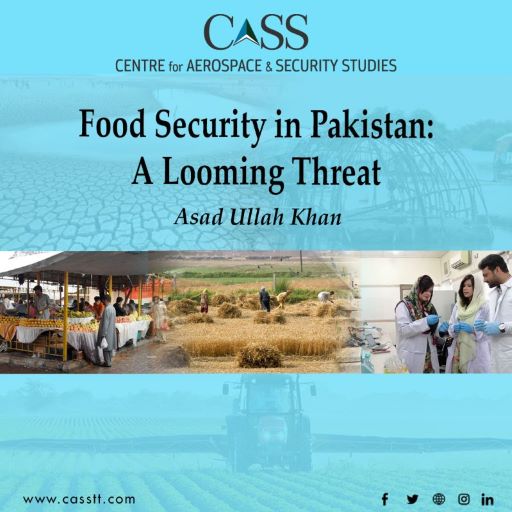The immense impact of non-traditional security issues have changed the very nature of existential threats to states. Countries around the world have realised the significance of addressing non-traditional threats, for instance, the threat of food insecurity. The case of Pakistan is not very different either where the challenge of food security has hit the country hard. This is primarily because of the lack of advancement in agriculture sector, economic difficulties, and its vulnerability to natural disasters. All three challenges are interlinked and improving each one of them will ensure food security in Pakistan.
In Pakistan, most agricultural activities are carried out in villages where a majority of farmers are uneducated and not aware of the advancements and modern techniques in agricultural methods to increase crop productivity. In this regard, the government is keen to improve their education. There are 41 universities in Pakistan which offer BSc in Agriculture. However, not a single university among them has international ranking nor made significant contributions to strengthen the agriculture sector in Pakistan. Along with this, communication gap between farmers and scientists, capacity to invest on modern equipment, lack of awareness, unavailability of quality seeds resistant to certain weather conditions and pests, and absence of will of the government are all major causes of reliance on obsolete methods of farming. Resultantly, farmers are not able to produce the desired quantity and quality crop yields.
Similarly, efficient use of water is necessary for the agriculture sector. However, experts believe that Pakistan is gradually becoming a water scarce country. According to an estimate, Pakistan is losing 13 million cusecs of water every year from its rivers into the sea leading to economic losses worth USD 29 billion. Pakistan’s irrigation system is currently based on ‘Furrow Irrigation’ technique, commonly known as ‘flood irrigation’ which is one of the oldest irrigation techniques in the world. In Pakistan, around 60% of the water is lost mainly due to use of obsolete methods of irrigation. Many countries around the world have stopped using such techniques because the wastage ratio is very high. To make use of innovative technologies like drip irrigation (suitable in certain atmospheres and soil conditions), spray irrigation could be adopted.
A country like Pakistan which is heavily dependent upon imports despite having an agro-based economy is unable to meet its food requirements. According to a statistic, the cost of food in December 2022 increased by 35.5% on year-on-year basis which was the second highest in the South Asian region. Consumer price inflation for food prices has been on the rise due to the ongoing financial crisis as more than 6000 containers of necessary food items are stuck at ports due to unavailability of funds. The solution to the problem is simple – bring financial stability in the country, and improve the production, processing, storage and delivery of food items across the country.
Natural disasters affect states and their citizens adversely. However, there is a need to mitigate their adverse effects. Pakistan – one of the most vulnerable states to climate change, is affected from floods, heat waves and glacier melts every year, ultimately leading towards food insecurity. Climate change at the global level has increased the occurrence of natural disasters particularly floods in Pakistan. There is a dire need to utilize technology and educate our farmers to promote climate-smart agricultural practices. This will also lead us towards the adaptation of more resilient, responsive and effective food supply chains.
To conclude, to ensure food security, sustainable agricultural practices, overcoming economic difficulties, and resilience against climate change and natural disasters should be given top priority at the national level. A recent report by the Centre for Aerospace & Security Studies, offered several recommendations by experts that precision agriculture and perennial irrigation were needed to bring efficiency in Pakistan’s agricultural practices, and the need to declare ‘food security’, a national security imperative. To bring economic stability vis-à-vis food security, increasing in-house production of food would not only help the country overcome its food security challenges but also contribute towards efforts of economic stability in the country.
Asad Ullah Khan is a Senior Research Associate at the Centre for Aerospace & Security Studies (CASS), Islamabad, Pakistan. He can be reached at snr.res.a@casstt.com.




